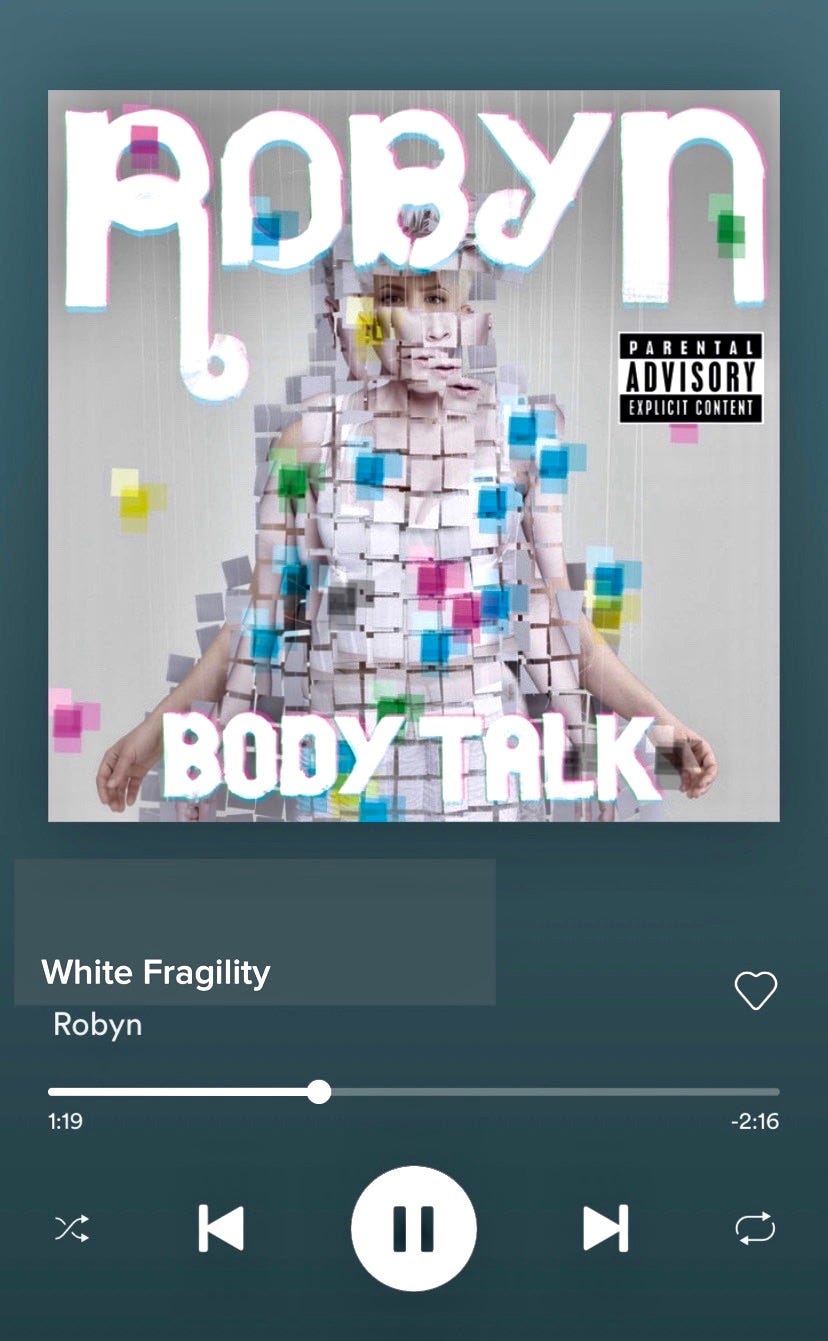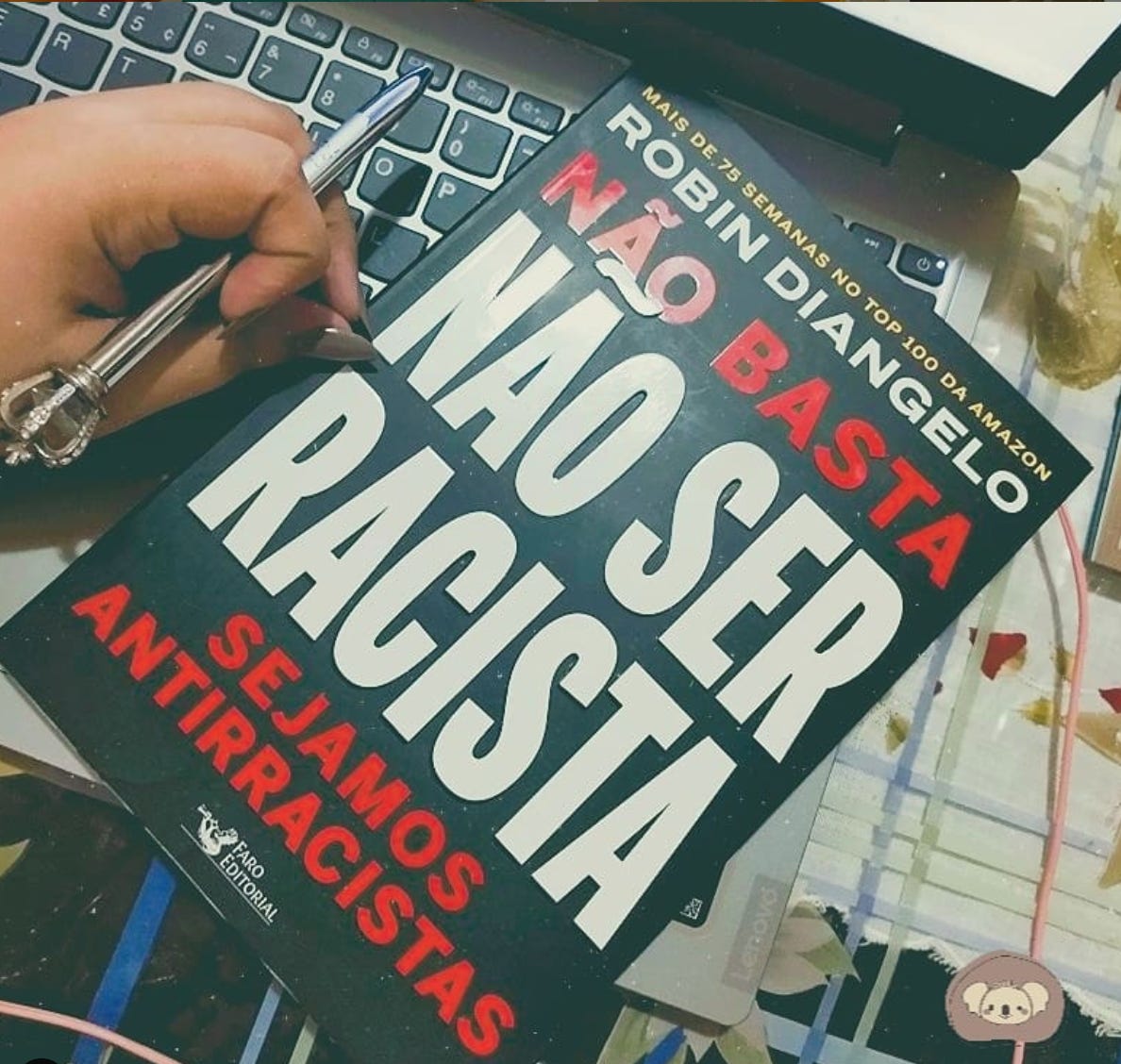Ten thoughts (sort of) about White Fragility
Should white people talk to each other about racism and whiteness? And if so, what should we be saying?

Notes: This week’s dedication is a bit different. I’m kicking off my organizing cohorts on Monday and, as I was putting the finishing touches on my first session, I was just flooded with gratitude for Popular Educators past and present. I hadn’t realized until this curriculum came into being how much my life has been changed by Paulo Freire and bell hooks and Myles Horton and Septima Clark and Grace Lee Boggs and adrienne maree brown and Will Campbell and others who taught me that change is not about charismatic individualist leaders but about tapping into a deep abiding love for the people with whom you get to work.
Let us never forget that the best gift this world has ever given us has always been other human beings.
As a white person who writes about whiteness for a relatively tiny audience, I get asked a fair bit about my thoughts about Robin DiAngelo (a white person who writes about whiteness for an exponentially larger audience). More specifically, people ask me “should I read White Fragility?”
There is a short answer to that question (“sure, if you want to”), as well as plenty more interesting and complicated ones (Dr. Chanequa Walker wrote a very good thread about it and Lauren Michele Jackson’s Slate piece on DiAngelo and the limits of whiteness studies is a crucial read)
As both Walker and Jackson’s answers are truly stellar, I’m not going to proffer my own (as it would merely parrot their work). Thinking about the question, however, sends me down a whole bunch of knotty rabbit holes that are about much more than the value of a single book by a single author.
First off, the fact that we’re so obsessed with finding the perfect racism book is so indicative of this moment we’re in, where the Collective Chorus of Good White People is feeling unmoored by change and desperate to ground ourselves in Definitively Right Answers. It’s why we’ve turned to lists of “what to do and what to read” in the first place. It’s why, when we heard rumors that some people think that the book we were told was Good is actually Bad, that we then become sheepish about our choice. It’s why we try to find the alternatives that fit our political or social niche- why abolitionists say “read Angela Davis instead of DiAngelo” and socialists say “read Frantz Fanon…” and healers/therapists/people with kind eyes say “read Resmaa Menaken…” (side note— those authors are great but their works are trying to do different things from DiAngelo… she recommends them as well).
I am empathetic to this instinct, but I don’t have to tell you that the deliverance we’re all seeking right now is fictive, right? None of us will find salvation either in accepting or rejecting a single book. The promised land has no immediate plans to open its gates regardless of whether we read that popular book by that white lady or reject it for a perfectly curated list of “Books By Black Authors Purchased From Black Bookstores.” What lies ahead is messy and hard and that’s ok— every other racial group has had to live with that truth far longer than us.
I also realize something weird and not particularly pleasant happens to me when people ask me about DiAngelo or Tim Wise or SURJ or any other white anti-racist author or group. My first reaction is to critique them, to learn more about them with the intention of eventually declaring them to be garbage. If I’m honest, I was skeptical when I first picked up a copy of White Fragility, not because I had any particular reason to dislike it but because I’m naturally skeptical every time I pick up a book by another white person. There’s a lot there, and it’s not rooted in a belief that I’m a uniquely gifted Pale Racism Interlocutor. Quite the opposite, actually. When I don’t process my own shame and guilt and imposterishness in this work in productive ways, it’s easy to project that onto other white people fumbling their way through racial justice work (“well, I’m a sham, so they’ve gotta be a sham too”). Throw in some classic white American individualism and competitiveness and barrel-of-crabs nonsense and there you go. I’m not sure if self-awareness is a fully effective salve for it, but that’s where I’ve started. And though I finally did read White Fragility with an open mind, it took a lot of mental resets.
Sometimes (but not always), when people ask about whether they should read the book, they’re curious about whether its actual content is helpful. And yes, in a lot of ways it’s super useful. As Walker’s thread acknowledges, DiAngelo was central in providing language to describe a ubiquitous and deeply annoying phenomenon (namely, white people being individually defensive in conversations about race). And that’s a very significant contribution. When I talk to white people who have benefited from the book, they speak frequently to how much easier it is to get over a problematic pattern now that it is named and codified— for some, it helped them notice it for the first time, for others, it took it out of the realm of personal guilt. If you personally benefited from reading this book, I hope that my affirmation of its real contributions aren’t coming off as patronizing or as a classic Southern “well, bless her heart…” set-up for a takedown. I mean them sincerely.

Not for nothing, but the Portuguese-language cover is so much better (Instagram user koalaleitora)
Previous to the last couple months, the book was also frequently recommended by a decent number of Black, Brown, Asian, Arab and Indigenous people (particularly those in the professional managerial classes whose jobs or social networks put them into contact with a lot of relatively cosmopolitan white middle-and-upper class people). I’ve personally heard many folks whom I respect speak to the valedictory impact of a mass market book by a white person naming something that they had often complained about but which was frequently denied institutionally. This too is a truly valuable contribution.
Here, then, is where all this gets complicated, and where the question becomes less one of “how useful is this individual book?” to “how useful is it for white people to talk about race and racism at all?” Even before White Fragility became the biggest boom property in the Great Antiracist Book Gold Rush of 2020, it was already worth asking the question “wait… is DiAngelo actually saying something unique as a white person here or is she just getting credit for being a white voice saying the same thing Black and Brown and Indigenous people have been saying?” This in turn raises the bigger question of where do you draw the line between “white people need to talk to each other about race” and white anti-racist celebrities repeating the sin of Elvis’ reconstituted blues riffs and Alison Roman’s direct-object-plus-tumeric-plus-hashtag-equals-lifestyle-brand stews?
As you’ll see, here’s where my (I hope good faith) criticism of DiAngelo starts coming into relief. Before I do so, though, let’s not get it twisted— the fact that I haven’t faced DiAngelo-levels of backlash for being a white person who writes about race has everything to do with my minimal visibility and nothing to do with me being beyond reproach here. Sure, I’ve got a set of principles I try to hold myself accountable to, both in content (I try not to merely repeat things that BIPOC people have been trying to say to white people and instead reflect, as a white person, on the internal dynamics between us that keep us from internalizing those requests) as well in terms of how much room I’m taking (platform, money, etc.) in heterogenous anti-racism spaces. But (a). the bar I’ve set for myself may not be enough to minimize harm and (b). even if it is, I likely (definitely) don’t always hit it. I don’t share this as self-flagellation— I think it’s a pretty matter of fact reality, one which requires accountability and flexibility and openness to criticism but a minimum of white authorial tears.
DiAngelo is getting a lot of criticism right now, largely because her book is SO popular and it would seem (if rumors of speaker’s fees are to be believed) that she is making a lot of money from this. This is clearly on her mind— on her website she has a whole page about her accountability commitments and where she sends some of her money and whom she lofts up for opportunities. I’m sure she’s trying to be thoughtful about it. I’ll merely offer that, in this moment when her profile has grown and the dollars are likely rushing in well beyond what she needs for self-sufficiency, there could be so much power in her pushing herself forward, in modeling what it looks like to take actions that could be risky for her career (like telling people to not buy her book). I’d love to see this not as an act of performative contrition, but as a case study for white people in general about how we move past those privileges that we are most likely to cling to. I don’t think she should don sackcloth and parade around town to atone for her fame, but I’d love to learn alongside her as she navigates anti-racist responsibility given her platform.
This actually points to my biggest criticisms of White Fragility. When I was finally able to put my initial unfair skepticism aside and start reading the book, I was hoping that the text would offer a critical, probing, humanistic analysis of white defensiveness— why we fall into it, how we’re unaware of why we’re doing it, how we might find our way to the other side. Here is where DiAngelo’s insider-outsider status as a white person who spent decades facilitating workshops about race in heterogenous groups could have been really fascinating. Instead, she primarily does a couple things— relating examples of white people behaving badly in her workshops and then layering on an anti-racism 101 text on top of it. The result isn’t at all incorrect, but it is tautological: “Why do white people do this specific racist and unproductive thing? Because of their racism.” Again, it’s an important point, but one that plenty of other BIPOC writers and trainers have already made quite successfully (personally, I feel that adrienne maree brown’s most recent essay to white people provides a more profound take on all this in 1/50th of the words).
By contrast, when I think about texts I’ve read by white people about racial justice that aren’t merely situationally helpful but that push me in new ways, they all share a deeper curiosity about the specific white people that they’re using as examples (whether that’s the author themselves or their subjects). They’re interested not in merely excoriating specific behaviors but understanding the collective and individual psychological forces that conspire to make solving for them so knotty. I’m thinking here of sociological books like Arlie Russell Hochschild’s Strangers In Their Own Land (about rural conservative white people) or Margaret Hagerman’s White Kids (about cosmopolitan white liberal parents) and memoirs like Will Campbell’s 40 Acres and a Goat or Courtney Martin’s newsletter. They are the kind of texts that require at least some level of access to the interiority of whiteness to write but that relate individual struggles to the collective project of ending white supremacy.
I don’t know definitively why DiAngelo’s text lacks that same curiosity or interest in its subjects. My suspicion, though, as somebody who also has spent a (much shorter) time on the Diversity Equity and Inclusion training circuit where DiAngelo built a career, is that the entire DEI field is mired in a deeply individualistic, unimaginative, non-forward-thinking framework. If you’re an anti-racist trainer, you are often called into organizations where white individuals are being jerks and your charge is to make them slightly less jerkish. And the thing is… that’s important work! Having been a white jerk in an office, I can definitely affirm that we can truly make life awful for our BIPOC colleagues. The problem is, if that’s where your collective liberation work stops, you’re not actually going to contribute to the building of a better world. You’re trying to correct deficits in individuals instead of helping groups imagine how to build the world they desire together. And when you’re a white educator or activist, it means that you’ll spend your time merely lecturing other white people on how they’re wrong rather than being curious as to what’s holding us all back and how we try something different together.
And here we end up right back where we started. The disease that got us here is a social system that has told white people that we can live our lives as non-accountable islands. If our reaction to the disruption to that regime is individualistic, if our goal is merely to learn how to avoid doing the Bad things personally, we’ll be stuck in this spot forever. I firmly believe that there is a role for white people to write and speak to each other about race— not to point out the problem or its impact on BIPOC people— but to figure out together how our community can fumble our way forward, together. As we do so, there are a lot of texts that will help each of our own journeys.
For many, White Fragility will be part of that story of building towards something better and, for that, I am so grateful. My hope, though, is that after somebody reads it their mind turns less towards how they can be a Stellar Star Student in their company’s next DEI workshop and more towards imagining the future organizing work they’re going to do with other white people. And then, in turn, I hope that they take less and less interest in merely purifying their own thoughts and actions and more and more interest in what they need to learn and discover about the white people with whom they’re working.
This week’s song is so on the nose and it repeats the joke I already made in the header but I couldn’t resist.






Yes, Garrett, and everyone else reading this, I'm learning how deeply I *need* the people who read White Fragility and stop there. Somehow, I've internalized that I am to be the only (and, let me note, #exceptional) white person in the room of all BIPOC colleagues, and that's what collective liberation looks like. I don't want to invite other white people into the room because it gets MESSY when a) I can't control what they will think/say/do and 2) I take responsibility for their actions and emotions, rather than my own (lesson #1 of Nonviolent Communication: emotions are not private property but they are our individual responsibility) and 3) I want them to be better and do better, and it reminds me of all the ways that I want myself to be better and do better. It's so related to what Brené Brown talks about when she says that shame is not an effective motivator, and yet I do it (mostly in my head, but still loudly) to other white people all the time. There's so much that I can observe in myself + other people reading White Fragility of Gloria Anzaldúa's notion of the collective shadow. The more we can claim, collectively, of our shadow, the less likely we are to project it onto and harm others. And, as I'm doing work with other white Episcopalian folks on racial justice right now, I'm learning the truth of Claudia Rankine's language of being "less interested in being right than in being true, being together."